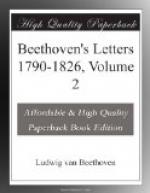Moedling, a village near Vienna, and Beethoven’s favorite summer residence.
Mollo, music publisher in Vienna, afterwards the firm of Steiner & Co., and at a later period that of Haslinger.
Moelk, the celebrated abbey on the Danube.
Moelker Bastei, the, at Vienna, on several occasions Beethoven’s residence in the house of Baron von Pasqualati (see also Schindler’s “Biography,” i. 187).
Moscheles.
Mosel, Hofrath Ignaz von, in Vienna, a well-known music writer, and the founder of the Conservatory of Music in that capital.
Mozart.
Munich.
Mythological subjects, reference made to, by Beethoven, who, as it is well known, possessed a considerable acquaintance with ancient history.
Naegeli, Hans Georg, the distinguished founder of men’s vocal unions in Switzerland, also a popular composer of vocal music, a music publisher, and, at a later period, educational inspector in Zurich.
Napoleon, when General Bonaparte, so greatly admired by Beethoven, that on the occasion of that General’s appearance, the master was incited to compose the “Eroica,” which he dedicated to him ("Napoleon Buonaparte—Luigi van Beethoven"). On hearing, however, of the coronation of his hero as Emperor, he angrily cast aside the intended presentation copy of his work, and refused to send it to him.
Neate, Charles, a London artist, and a great admirer of Beethoven, with whom he became acquainted in Vienna in the year 1816.
Nussboeck, town sequestrator at Vienna, for some time the guardian of Beethoven’s nephew.
Nussdorf, a favorite summer residence on the Danube, near Vienna.
Oliva, a philologist and friend of Beethoven. According to Schindler ("Biography,” i. 228), he repaired to St. Petersburg in 1817, in which city he settled as professor of German literature; Schindler is, however, mistaken in the date which he has given.
Oppersdorf, Count Franz von, Beethoven’s friend and patron.
Pachler-Koschak, Marie, of Gratz, to whom Beethoven was warmly attached.
Papageno.
Paris.
Parry, Captain, wrote on the music of the Esquimaux.
Pasqualati, Baron von, merchant in Vienna, an ardent admirer of Beethoven, and his constant benefactor. In 1813 Beethoven again occupied apartments appropriated to his use by the Baron at his residence on the Moelker Bastei, and remained there until 1816.
Penzing, a village near Vienna, a favorite summer residence.
Peters, C.F., “Bureau de Musique” in Leipzig (see also Hofmeister).
Peters, councillor of Prince Lobkowitz at Vienna, a friend of Beethoven.
Philharmonic Society in London. In Laibach.
Pianoforte, Beethoven’s remarks concerning the.
Pilat, editor of the “Austrian Observer.”
Plutarch.
Portraits of Beethoven.




